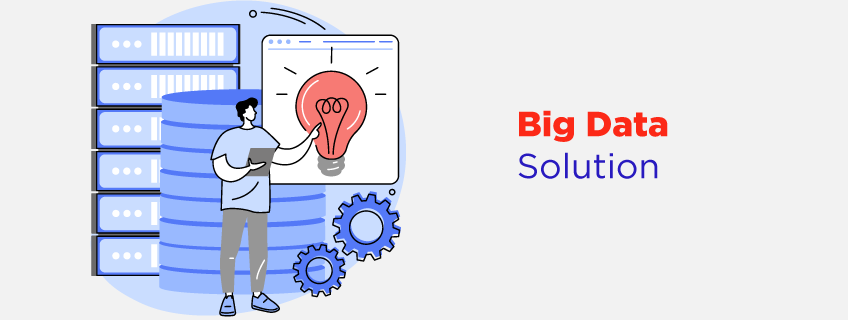Nowadays, the world is digitally connected, and the use of data has become especially important in every field. Data has set new directions in the areas of the Internet, social media, e-commerce, science, business and organic resources. Additionally, management and analysis of data have also become increasingly important, and ‘big data solutions’ are playing an important role in this.

Features
Scalability: An important feature of big data solutions is scalability. These systems can scale up and down data volumes, allowing organizations to keep pace with changing data.
Performance: Big data solutions help in using data faster and more efficiently. These systems provide high performance across the board with the help of hardware and software.
Clarity: Big data solutions can display data clearly. This gives users accurate and clean information from the data, which improves their decisions and actions.
Security: Big data solutions have the capability of secure data storage and management. Data security is an important priority, and high levels of cryptography and other security standards are followed.
Customization: These solutions can be customized so that they meet specific requirements. Data solutions can be designed according to the needs of businesses and organizations.
Real-time Analysis: Big data solutions have the capability of real-time analysis, allowing data to be presented instantly and decisions to be made.
Integration: These solutions can integrate well with other business systems and applications, allowing data to be aggregated from other sources.
Quality: Data quality is important in big data solutions, and its integrity and ability to be improved as much as possible.
How does a big data solution work?
Data Storage: In the first step of a big data solution, large data sets are stored. For this, a special storage system is used, which has the power to store huge amounts of data. This may include databases, data warehouses, data lakes, and cloud storage.
Analysis of Data Ingestion: After data collection, the process of data ingestion is done in the data reconciliation system, in which data is entered from new data sources. It is the process of bringing data into the system so that it can be analyzed.
Data Storage and Management: Once data is stored, it is managed securely and scalable. The data is prepared in a special way to make the analysis process faster.
Data Analysis: It uses machine learning, data mining, statistical analysis, and other analysis techniques to obtain new insights from data. During examination, patterns, trends, and wisdom are discovered from the data.
Data Visualization: Through data visualization, data is displayed in the form of graphics, charts, and graphs, which makes the data easier to understand and helps in decision-making.
Utilizing Insights: When data analysis is completed and new information is obtained, it is presented to users and decision-makers so that they can make the right decisions and support their particular goals.
Implementing for Business: New knowledge is used in business processes to take action and make decisions.
Continuous Improvement: Special attention is paid to the information obtained through data reconciliation, and constant checking is done to improve the process.
Advantages of big data solutions
Better Decision Making: Big data solutions help businesses and organizations make better and more information-based decisions through deep analysis of data.
Discovering New Insights: Big data solutions help find patterns and trends in data, thereby identifying new insights and opportunities.
Improved Business Performance: The use of big data solutions can improve the performance of businesses as they gain information to improve the organization’s processes.
Financial Savings: Big data solutions can benefit businesses by making financial processes better and more effective and reducing expenses.
Improved Customer Service: Through big data solutions, customer views can be studied, and their service can be improved, thereby increasing customer satisfaction.
Risk Management: Through data analysis, businesses get the ability to detect and manage risks, thereby avoiding losses.
Disadvantages of big data solutions
Privacy Concerns: The use of big data solutions can give rise to data privacy issues, especially when it stores personal information.
Security Risks: Data settlement systems may contain security threats, and a high level of security measures are required to handle these.
Integration and Organizational Challenges: Integrating a big data solution with other systems and processes can sometimes pose calibration and organizational challenges.
Data Quality: Data solutions may face quality challenges due to fraud and tampering, which can lead to trust issues.
Action Delays: There may be delays in taking action after data is analyzed, which may harm some users.
Data Overload: Due to the excessive amount of data, users of data solutions may, at times, become overwhelmed with data and need help locating the right information.
Learning and Management Challenges: Big data solutions may face learning and management challenges, especially when new technologies are used.
Use of Big Data Solutions
Financial Analysis: In the banking and financial sector, big data solutions are used in loan credit scoring, economic advance modelling, and fraud prevention. It helps in improving financial decisions and simulating financial updates.
Marketing and Supply Chain Management: In the marketing field, data solutions can be used in customer credit checking, marketing store stock management, and tracking customer sentiments.
Healthcare: In the medical field, big data solutions can analyze patient data to provide the right treatment and help improve healthcare services.
FAQs
Disadvantages such as privacy issues, security threats, data quality-related challenges, and excessive data access can occur.
It collects data, analyzes it, detects patterns and trends, acquires new information, makes decisions, and takes action.
There are four major types of big data solutions: data storage and processing, data analysis, data visualization, and making decisions and taking action from data.
Conclusion
Big data solutions are playing an important role as an important source of data in today’s digital age. Using these solutions helps in deriving new insights from data, making decisions, and managing the business in a better way. Without a doubt, big data solutions are part of our digital future and will help us move forward.
[hurrytimer id=”15221″]